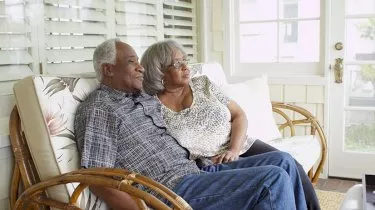Retirement
Breaking down COVID-19’s impact on retirement outcomes
Delayed retirement, job loss, lower dividends and a lost “sense of invincibility” – a retirement expert has shone a light on some of the ways Australian retirees are set to feel the pinch of this pandemic.
Breaking down COVID-19’s impact on retirement outcomes
Delayed retirement, job loss, lower dividends and a lost “sense of invincibility” – a retirement expert has shone a light on some of the ways Australian retirees are set to feel the pinch of this pandemic.

According to Will Burkitt, retirement innovation leader and partner at Mercer, the overwhelming sentiment around COVID-19 continues to be “uncertainty” – which is creating “very real issues” for many Australians throughout a number of stages of retirement.
He flagged four main groups who are set to suffer through the economic downturn associated with the health crisis:
Delayed retirement
“Many Australians approaching retirement are now facing the real prospect of having to delay their retirement date and work for longer,” Mr Burkitt said.

He explained that this is on the basis that the size of their savings has significantly been depleted from the fall in capital markets and the prospect of housing valuations falling as well.
Predicting that it is likely going to take a couple of years for capital markets to rebound to the level they were at prior to the COVID-19 pandemic, the retirement expert commented that many pre-retirees “are also having to dip into their retirement savings to get by in the short term”, including through utilisation of the government’s early access to superannuation scheme.
What is the financial impact of withdrawing your super early? nestegg has the numbers here.
Forced unplanned retirement
Another “sad outcome” flagged by Mr Burkitt is “the reality of many businesses and organisations needing to cut their costs or businesses ceasing to being financially viable”.
This will impact with higher unemployment rates across the country in medium to longer term, the retirement expert conceded, highlighting how there will be a cohort of Australians in their 50s and 60s who will lose their job in the workforce and also not be able to find replacement work as they may hope.
It’s not a new phenomenon: “A trait in workforces across Australia, pre-existing COVID-19, is the prevalence of discrimination against experienced works, being those aged 50 years or more.”
“Among long-term unemployed Australians, the average number of weeks a mature aged person is long-term unemployed is approximately 75 weeks, while it is 48 weeks for all age groups,” Mr Burkitt said.
In addition, while roughly 37 per cent of unemployed mature aged people are long-term unemployed, only 24 per cent of unemployed all age groups people are.
“It is a distinct possibility that this discrimination in workforce decision-making will widen even further post COVID-19,” he added.
Early-stage retirees
Mr Burkitt also highlighted the position a number of early-stage retirees are suddenly finding themselves in.
“Spare a thought for retirees who have only recently retired, say in the past few years, who now face into the remainder of their retirement with a smaller pool of wealth and hence will need to either source new additional income or manage within a lower living standard to curb expenses,” he said.
According to the partner, the impact from “sequencing risk”, the risk of a significant decline in wealth valuations at a crucial time in a person’s life, coming true for early retirees is “significant”.
With most retirees not holding any annuity product to provide them with a guaranteed income stream, Mr Burkitt said “they are impacted with a decline in their allocated pension pool and other COVID-19 impacts such as significantly reduced dividends being paid by listed companies”.
A negative perception of annuities is pervasive in Australia – but do we have this wrong?
In the meantime, the retirement leader has conceded that another impact of COVID-19 -elated spending will be the government’s reduced ability to fund social security for the aged pension, aged care and healthcare over the medium to longer term.
“This is due to the need for the government to manage down a significantly larger pool of debt as a result of the COVID-19-related stimulus.”
Early to later-stage retirees
Last but not least: “There are many early retirees facing broken dreams from the cruel nature of the COVID-19 pandemic and its spread through physical contact,” Mr Burkitt raised.
The tragedies that have unfolded aboard cruise ships is a tragedy for all retirees, he said, with cruising having become the preferred approach for enjoying travel in retirement.
“Retirees will now be questioning whether it is in their best interests into the future,” he said.
Not only this, the current pandemic would see many retirees having “their sense of invincibility shattered”.
According to Mr Burkitt, “COVID-19 has been a rude awakening for people in their 60s and 70s: Just because they are healthy and able to enjoy retirement as they dream [it], they are in fact vulnerable to health shocks.”
This will shape a change in lifestyle decisions into the future, he offered.
About the author

About the author


Retirement Planning
Majority of Australians still unsure about their retirement prospects
A recent survey conducted by MFS Investment Management® has shed light on the ongoing uncertainty faced by many Australians regarding their retirement plans. Despite a slight increase in confidence ...Read more

Retirement Planning
Wage growth steadies as businesses navigate economic challenges
In a sign that the Australian labour market may be finding equilibrium, wage growth has stabilised this quarter, according to Employment Hero's latest data. This development comes as employers ...Read more

Retirement Planning
Simplified retirement advice: Key to overcoming behavioural biases, experts say
In a bid to enhance retirement outcomes for Australians, a recent whitepaper by Industry Fund Services, in collaboration with Challenger, has highlighted the importance of simplifying retirement ...Read more

Retirement Planning
Rest launches Retire Ready digital experience to empower members approaching retirement
Rest, one of Australia’s largest profit-to-member superannuation funds, has unveiled a new digital experience aimed at making retirement preparation simpler and more personalised for its members. Read more

Retirement Planning
New Framework Aims to Bridge Australia’s Financial Advice Gap
A ground-breaking framework introduced by the Actuaries Institute promises to revolutionise how Australians access financial support, potentially transforming the financial wellbeing of millionsRead more

Retirement Planning
The downsizer dividend: how Australia’s ageing shift will reshape property, finance and AI strategy
Downsizing is moving from a personal milestone to a system-level lever for Australia’s housing market. As policymakers court reforms and agents eye fresh listings, the real profit pools will accrue to ...Read more

Retirement Planning
Half of Australians financially insecure about retirement as AMP launches new initiative
In a significant move aimed at addressing the retirement concerns of Australians, AMP has unveiled the Retirement Confidence Pulse, a national barometer designed to gauge the financial confidence of ...Read more

Retirement Planning
North introduces Grow to expand Australia's financial advice footprint
In a bid to bridge the gap between the demand for financial advice and its accessibility, North, a prominent platform for superannuation and retirement in Australia, has launched an innovative ...Read more

Retirement Planning
Majority of Australians still unsure about their retirement prospects
A recent survey conducted by MFS Investment Management® has shed light on the ongoing uncertainty faced by many Australians regarding their retirement plans. Despite a slight increase in confidence ...Read more

Retirement Planning
Wage growth steadies as businesses navigate economic challenges
In a sign that the Australian labour market may be finding equilibrium, wage growth has stabilised this quarter, according to Employment Hero's latest data. This development comes as employers ...Read more

Retirement Planning
Simplified retirement advice: Key to overcoming behavioural biases, experts say
In a bid to enhance retirement outcomes for Australians, a recent whitepaper by Industry Fund Services, in collaboration with Challenger, has highlighted the importance of simplifying retirement ...Read more

Retirement Planning
Rest launches Retire Ready digital experience to empower members approaching retirement
Rest, one of Australia’s largest profit-to-member superannuation funds, has unveiled a new digital experience aimed at making retirement preparation simpler and more personalised for its members. Read more

Retirement Planning
New Framework Aims to Bridge Australia’s Financial Advice Gap
A ground-breaking framework introduced by the Actuaries Institute promises to revolutionise how Australians access financial support, potentially transforming the financial wellbeing of millionsRead more

Retirement Planning
The downsizer dividend: how Australia’s ageing shift will reshape property, finance and AI strategy
Downsizing is moving from a personal milestone to a system-level lever for Australia’s housing market. As policymakers court reforms and agents eye fresh listings, the real profit pools will accrue to ...Read more

Retirement Planning
Half of Australians financially insecure about retirement as AMP launches new initiative
In a significant move aimed at addressing the retirement concerns of Australians, AMP has unveiled the Retirement Confidence Pulse, a national barometer designed to gauge the financial confidence of ...Read more

Retirement Planning
North introduces Grow to expand Australia's financial advice footprint
In a bid to bridge the gap between the demand for financial advice and its accessibility, North, a prominent platform for superannuation and retirement in Australia, has launched an innovative ...Read more








